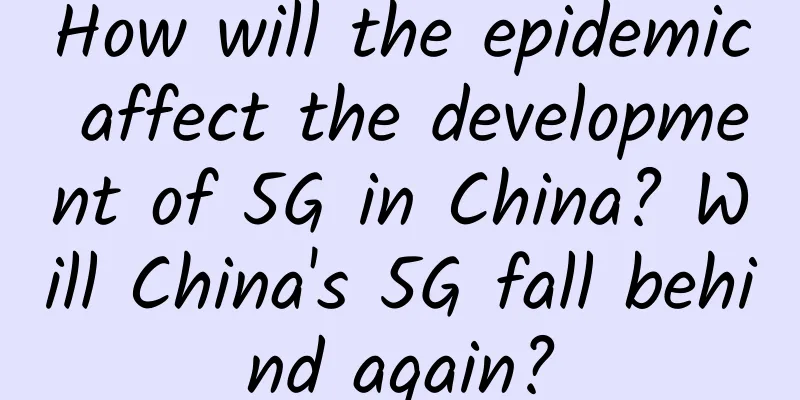How will the epidemic affect the development of 5G in China? Will China's 5G fall behind again?

|
During the 2020 Spring Festival, the "new coronavirus" triggered another nationwide epidemic since SARS, and the World Health Organization also listed it as a public health emergency of international concern. Subsequently, many countries issued travel warnings and entry restrictions against China. From the current situation, the impact of the epidemic on China in all aspects is undoubtedly huge. According to the analysis of the research report of Ren Zeping's team at Evergrande Research Institute, the epidemic will have a considerable negative impact on the macro-economy in the short term. Prevention and control of the epidemic requires the population to avoid large-scale movement and gathering, isolation and prevention and control, and people's consumption demand will be greatly reduced. At the same time, local governments have issued administrative orders to delay the resumption of work, enterprises have stopped work and reduced production, and investment in manufacturing, real estate, and infrastructure has basically stagnated in the short term. Due to the sharp drop in demand and production, investment, consumption, and exports have all been significantly impacted, with short-term unemployment and price increases. For example, the catering giant Xibei expects to lose 700-800 million yuan in revenue in the month before and after the Spring Festival, and the salary expenditure of more than 20,000 employees will require 150 million yuan. If the epidemic is not effectively controlled in a short period of time, the cash on Xibei's account will not last more than three months, and it will face layoffs or even bankruptcy. The report believes that the epidemic will interrupt the weak stabilization of China's economy at the end of 2019. Against the backdrop of greater downward pressure on the economy, it is highly likely that the growth rate will break 6, and may even break 5 in the first quarter. Of course, the report still gives people great confidence in the end. The report tends to be positive about the long-term impact of the epidemic. It believes that government governance will be more transparent, and production and living formats will develop towards intelligence and online. Opportunities will be brewing in risks, and new formats may be created. As a self-media focusing on the communications industry, we are more concerned about how the domestic communications industry will develop under the extremely heavy macro-situation, and more importantly, how will domestic 5G develop? Some people may think that 5G does not have many application scenarios at present, and it is just a matter of whether the network speed is faster or slower, which is just icing on the cake, so the development of 5G is insignificant. There are many people who hold this view, but it must be said that this view is one-sided, short-sighted and wrong. In fact, compared with the history of my country's operators lagging behind the world in the construction of 1G~4G networks, in the 5G era, my country's operators have achieved synchronization with or even leading the world's mainstream operators, which is very precious. Because this leading advantage will be transformed into influence, if domestic 5G is successfully built into a successful model, it will be a strong demonstration effect for countries around the world. In this way, my country's 5G industry will be able to stand out from the blockade and suppression of the United States and other countries and successfully export. Once my country's communications companies take a leading position worldwide, not to mention the economic value, this itself will be of great benefit to China in getting rid of the impression of a low-end "world factory" and improving its international image. What impact will this epidemic have on the development of 5G in China? Is this impact positive or negative? Judging from the recent hot topics of public opinion, as the epidemic progresses, 5G has also frequently "appeared" as a hot topic. For example, Wuhan Leishenshan Hospital has achieved full coverage of 5G signals, which can carry the concurrent communication needs of 25,000 people and meet the needs of remote command, remote consultation, remote surgery and data transmission; for example, West China Hospital of Sichuan University and Chengdu Public Health Clinical Medical Center have achieved the first 5G remote consultation for two cases of new coronavirus pneumonia in the country. For example, Guangdong's 52 key medical and nursing areas will achieve full 5G coverage before February 10, and remote diagnosis and treatment will be sprinted. Judging from the above news, 5G seems to be booming during this epidemic, but this is only the positive side we can see. The other side is quite pessimistic. At present, a large amount of social resources have been concentrated on epidemic prevention and control, and other aspects have been affected to varying degrees. For example, the distribution of construction materials has been basically stagnant due to the epidemic. Base stations cannot be built without materials in place. In addition, companies including several major operators and upstream and downstream communication equipment companies have delayed their resumption of work to varying degrees, which has greatly affected the planning and construction progress of 5G networks. On another level, Wuhan is the center of the epidemic. The normal production and operation of Wuhan enterprises have been greatly impacted. As a major technology center, Wuhan's position in the 5G industry chain is very important. For example, on the wireless side, Wuhan has important equipment suppliers such as Wuhan Fangu, Accelink Technologies, HGTECH, and Hongxin Communications. On the wired side, Wuhan also has heavyweight companies such as Changfei Optical Fiber, Accelink Technologies, and Fiberhome Communications. In terms of the number of companies, Wuhan is the city with the most core enterprises in China except Shenzhen. Wuhan is mired in the epidemic, and the impact on the domestic 5G industry chain is very serious. Therefore, from a negative perspective, this epidemic will greatly delay the development of 5G in China in the short term, and may even disrupt the established 5G development plans at the national level. The worst outcome is that China's 5G will lag behind. After all, the current 5G standards have not yet been formulated. If we cannot keep pace with the world in terms of network construction, then our country's voice in global standard setting will also be lost. From another perspective, historical events tell us that every bad thing inspires some good things to happen. For example, the two world wars made the world's technological level advance by leaps and bounds, and the outbreak of this epidemic will also inspire some good things to appear. For example, epidemic prevention and control requires people to stay at home and avoid large-scale population movement, which has led to the rapid development of new work and life formats such as online consumption, online education, online office, and video conferencing. Currently, many companies including Tencent and Alibaba are adopting remote work instead of centralized office, which is likely to change the future work and management methods. As an efficient information-carrying network, 5G is undoubtedly in great demand in this new work and management scenario. From this perspective, the epidemic will promote the development of 5G to a certain extent. In addition, judging from the passive response of local governments in the early stages of the outbreak, after years of promoting smart city construction, our local government's information work is still very backward. At the very least, information disclosure and transparency are very insufficient. At the same time, emergency medical care is very weak and urban management is backward. If the government can learn from this valuable lesson, then after the epidemic, the government will accelerate the improvement of openness and transparency in government governance and coordination and organization capabilities, and information technology is indispensable. For example, big data is crucial for monitoring the destinations and retention time of population movement, which is directly related to the prevention and control of infection sources. As the foundation of the information society, the importance of 5G is highlighted. Finally, the epidemic may have interrupted the weak stabilization trend of China's economy since the end of 2019, worsened corporate operating efficiency and expectations, reduced the growth rate of residents' income, increased employment pressure, and pushed up debt and financial risks. In this case, the government needs to introduce policies in a timely manner to effectively hedge and support the economy, and accelerating the construction of 5G will be a good choice. To sum up, in the short term, the epidemic will greatly affect the development progress of domestic 5G. In the medium and long term, domestic 5G will usher in a good opportunity period amid risks. We will have to wait and see how it will develop specifically. |
<<: After the holidays, I return to work and upgrade my home router to welcome the New Year.
>>: When will 5G transform the manufacturing industry?
Recommend
China's communications industry is working together to accelerate the layout of the 5G era
[[182606]] In the discussion of 5G short code sol...
Want to know about 5G synaesthesia integration? Just read this article
Development Background Synaesthesia integration: ...
"Net Neutrality" Is Making a Comeback, Will the World Be a Better Place?
[[413633]] As part of his plan to promote large-s...
Three years after the license was issued, has 5G commercialization been successful?
It coincides with the third anniversary of China...
Traefik Enterprise Practice: TraefikService
Introduction The routing rules of traefik can imp...
There is a 1024-bit bug. The TCP data packets are so annoying!
1. Background Recently, I encountered a particula...
The communication AI market will reach $38.8 billion in 2031. The integration of 5G/6G and AI can bring multiple benefits.
The global deployment of 4G and 5G is faster than...
HTTP protocol interview challenges
I am an atypical interviewer. For the first quest...
OVH France/Canada High Defense VPS 50% off for the first month, starting from 14 yuan
Oluyun is a new Chinese hosting company that open...
Shenzhen OCT InterContinental Hotel, Shenzhen Telecom, and Huawei jointly launched the world's first 5G smart hotel construction
InterContinental Hotel Shenzhen OCT, Shenzhen Tel...
What changes will the integration of 5G and the Internet of Things bring?
The convergence of 5G and the Internet of Things ...
Ministry of Industry and Information Technology: Adjustment of 700MHz frequency band frequency usage planning
Recently, the Ministry of Industry and Informatio...
[6.18] V5.NET 20% off monthly payment for all independent servers, 30% off for specific models in Tsuen Wan, Hong Kong
V5.NET has launched this year's 618 promotion...
10 solutions for high-concurrency and high-traffic websites
1. Hardware upgrade An ordinary P4 server can gen...
What are the differences between VLAN and VXLAN? What are the application scenarios of VXLAN?
With the development of network technology, cloud...









